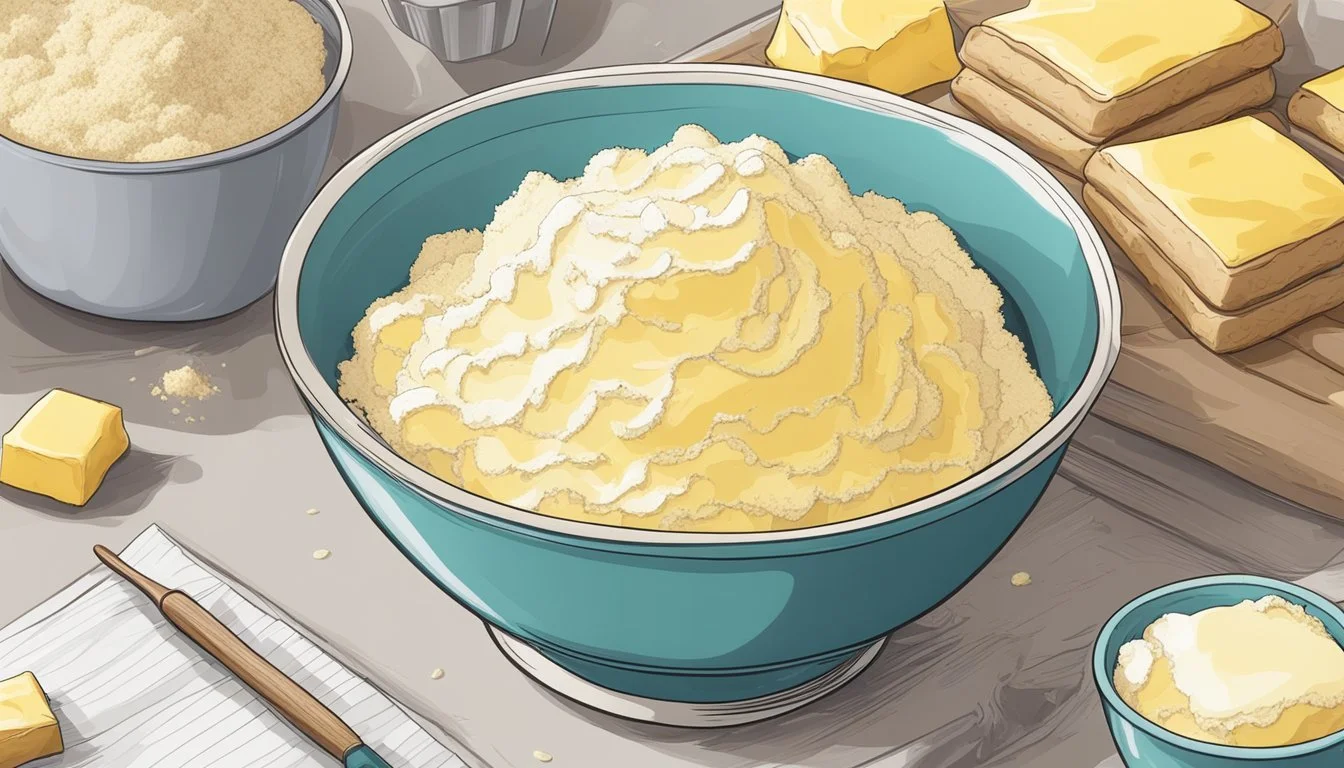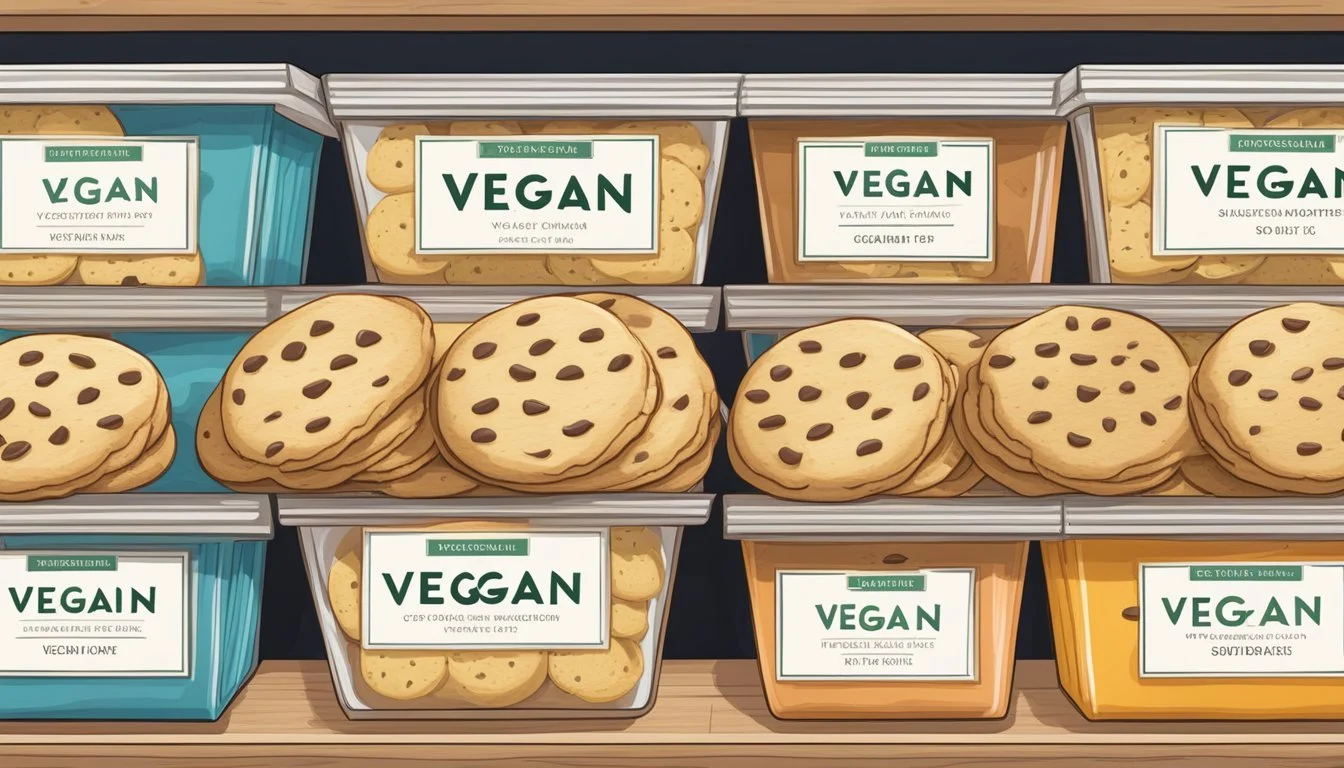Are Shortbread Cookies Vegan?
Unveiling the Ingredients
Traditional shortbread cookies, a classic treat originating from Scotland, are known for their rich, buttery flavor and crumbly texture. The simplicity of shortbread lies in its typical ingredients: sugar, butter, and flour. Unfortunately, for those following a vegan lifestyle, this means that standard shortbread recipes are not vegan due to the use of butter, an animal-derived product.
However, the rise of vegan baking has seen a surge in plant-based alternatives that allow for the creation of shortbread cookies without any animal ingredients. Vegan shortbread cookies substitute the butter with plant-based margarines, oils, or butters, such as coconut oil or vegan butter, and still maintain the characteristic texture and flavor of traditional shortbread.
The adaptability of shortbread recipes to vegan alternatives shows that vegan followers can enjoy these delightful cookies. By making simple substitutions in the ingredients, vegan shortbread cookies are not only possible, but they also offer a cruelty-free way to savor a classic treat.
Understanding Veganism
Veganism is a diet and lifestyle choice that excludes the use of animal products and byproducts. This approach to eating and living ensures all food preparation, clothing, and other lifestyle choices do not harm or exploit animals.
Defining Vegan Products
Vegan products are those which contain no animal derivatives. This encompasses a vast range of items from food to clothing, but in the context of food, it typically means the absence of ingredients such as meat, dairy, eggs, and honey. Veganism extends beyond diet, spreading to other areas to avoid all forms of animal exploitation. When evaluating whether a product is vegan, people look for labels that explicitly state "vegan" or ingredients that are plant-based.
Key aspects of vegan products include being:
Dairy-free: No milk, cheese, butter, or cream.
Egg-free: No eggs or ingredients derived from eggs.
Common Vegan Substitutes
In vegan cooking, common substitutions are made for traditional ingredients that come from animals. Here are a few staple replacements often used in vegan recipes:
Traditional Ingredient Vegan Substitute Butter Plant-based butters like those made from almonds or soy Eggs Flax or chia seeds mixed with water, mashed bananas, or applesauce Milk Plant milks such as almond, soy, oat, or coconut milk Cheese Nutritional yeast, cashew cheese, or other non-dairy cheeses
These substitutes aim to mimic the texture and flavor of the non-vegan originals while adhering to vegan principles. When making shortbread cookies, for instance, a vegan would use plant-based butter and substitutes for egg—if the recipe requires it—ensuring the outcome is dairy-free and egg-free.
Essential Ingredients of Shortbread Cookies
Shortbread cookies are traditionally made with a simple and elegant combination of key ingredients. This section explores the fundamental components of shortbread and how they can be adapted for vegan diets.
Traditional Shortbread Components
Flour: The base of shortbread cookies is typically all-purpose flour, which provides the structure and crumbly texture.
Sugar: Both granulated sugar and powdered sugar are used in traditional recipes to sweeten the cookies. Granulated sugar can add a slight crunch, while powdered sugar contributes to a tender texture.
Butter: The key to shortbread's rich flavor and tender texture is butter. It is used in ample amounts to create the classic melt-in-the-mouth consistency.
Salt: A pinch of salt is often included to balance the sweetness and enhance the overall flavor of the cookies.
Vanilla Extract: While not present in all recipes, vanilla extract is sometimes added for a subtle aroma and flavor.
Vegan-Friendly Alternatives
Vegan Butter: The dairy butter can be replaced with vegan butter or margarine to maintain the cookies' texture without using animal products.
Dairy-Free Milk: A small amount of dairy-free milk or even water might be introduced in some vegan recipes to adjust the dough's consistency.
Natural Sweeteners: In place of traditional sugars, some vegan bakers might opt for alternative sweeteners like coconut sugar, but powdered sugar can still be used if it's confirmed to be vegan.
Binding Agents: As some vegan butter alternatives have different melting points, additional binding agents like flaxseed might also be utilized to keep the integrity of the cookie.
By selecting vegan-friendly alternatives that mimic the properties of traditional ingredients, bakers can create shortbread cookies that uphold the classic texture and taste while adhering to a plant-based diet.
Baking Vegan Shortbread
Vegan shortbread cookies are simple to make and offer a delightful treat without the use of animal products. Key components include vegan butter and substitutions for traditional ingredients, ensuring an indulgent yet cruelty-free cookie.
How to Make Vegan Shortbread Cookies
To make vegan shortbread cookies, start by preheating the oven to a moderate temperature, typically around 325 to 350 degrees Fahrenheit. In a large bowl, combine flour and powdered sugar, then add softened vegan butter and a splash of vanilla extract. With a hand mixer or a spoon, mix the ingredients until a cohesive dough forms.
Next, it is crucial to chill the dough. This can be achieved by shaping it into a disc or rectangle and wrapping it with cling film or parchment paper. Place the dough in the fridge for at least 30 minutes, although some recipes suggest chilling overnight. This step makes the dough easier to handle and helps maintain the cookie's shape.
Once chilled, roll out the dough on a surface lightly dusted with flour to prevent sticking. Aim for a 1/4 inch thickness and use cookie cutters to create shapes. Place the cookies on a baking sheet lined with parchment paper. Prick each cookie a few times with a fork, which can help them bake evenly.
Bake the cookies in the preheated oven until they are lightly golden around the edges. This usually takes about 10 to 15 minutes, depending on the oven and cookie thickness.
Tips for Perfect Vegan Shortbread
Room Temperature Ingredients: Ensure the vegan butter is at room temperature before blending. This facilitates a smooth dough without lumps.
Uniform Thickness: Roll out your shortbread dough to a uniform thickness to ensure even baking. A rolling pin with thickness rings can be helpful.
Do Not Overwork the Dough: Mix the ingredients until just combined to keep the cookies tender.
Baking Sheet Prep: Always line your baking sheet with parchment paper to prevent sticking and achieve a consistent golden color without burning.
Gluten-Free Options: For a gluten-free version, consider using a gluten-free flour blend. Adjustments may be needed to achieve the same texture as wheat flour-based cookies.
Sprinkle of Sugar: Before baking, lightly sprinkle the top of each cookie with sugar if desired, adding a subtle sweetness and texture.
Watch the Oven: Since oven temperatures can vary, start checking the cookies a few minutes before the recipe's suggested baking time.
When handled with care, using these tips and the basic formula, vegan shortbread cookies are a straightforward and rewarding bake, sure to satisfy any cookie enthusiast's palate.
Vegan Shortbread Variations
Vegan shortbread cookies offer a delightful array of variations, just like their traditional counterparts. Through creative use of flavors and decorative elements, they can be adapted to suit any occasion, from Christmas to Easter, and beyond.
Flavor Additions and Substitutions
Chocolate Chip: To adapt classic vegan shortbread into a chocolate chip delight, fold in vegan chocolate chips before baking.
Lemon Shortbread: Incorporate the zest of one lemon into the dough for a citrus twist, making refreshing lemon shortbread cookies.
Vanilla Infusion: Enhance the dough with pure vanilla extract, giving a comforting aroma and taste to each bite.
Christmas Spices: For the holiday season, mix in spices such as cinnamon, nutmeg, or ginger to bring festive warmth to the cookies.
Easter Flavors: Around Easter, one can introduce vibrant tastes like orange zest or almond extract to give the shortbread a springtime vibe.
Decorative Touches
Melted Chocolate: Drizzle or dip cookies in melted chocolate to create a visual and tasty appeal.
Frosting: Use vegan frosting to decorate sugar cookies for any themed gathering.
Decoration: Sprinkle cookies with colored sugar or nonpareils prior to baking for a festive finish.
Vegan shortbread cookies can easily be customized for various seasons and holidays, making them a versatile and inclusive treat for all to enjoy.
Nutritional Considerations
When scrutinizing the nutritional aspects of vegan shortbread cookies, it's important to consider their calorie content and the availability of gluten-free options.
Calorie Content
Vegan shortbread cookies typically have a comparable calorie count to traditional shortbread cookies. The primary source of calories is the vegan butter or oil, which replaces traditional dairy butter. On average, a single vegan shortbread cookie might contain between 100 to 150 calories depending on size and ingredients.
Nutrition Breakdown:
Calories: 100-150 per cookie
Key Ingredient: Vegan butter or oil
Gluten-Free Options
For those looking to avoid gluten, the standard all-purpose flour used in shortbread can be replaced with a gluten-free flour blend. This alternative should be carefully chosen to maintain the texture and taste similar to that of regular shortbread cookies.
Key Substitution:
All-purpose flour → Gluten-free flour blend
It's essential for consumers to read labels or recipe details carefully, as not all gluten-free blends provide the same results. They should look for a blend that offers a good balance of starches and flours to replicate the structure provided by gluten in all-purpose flour.
Storage and Preservation
When storing vegan shortbread cookies, one must ensure that the cookies are kept in an environment that prevents them from going stale or becoming soggy. Achieving the optimal storage conditions extends the enjoyment of these baked treats.
Extending Shelf Life
Properly stored vegan shortbread cookies can maintain their quality for up to 3 weeks. The cookies should be completely cooled on a cooling rack before storage to prevent residual moisture from making them soft. For best results, cookies should be placed in an airtight container, separating layers with parchment paper to prevent sticking. If an airtight container is not available, one can tightly wrap the cookies in plastic wrap to protect them from air exposure.
Freezing and Thawing
Freezing offers a long-term solution for preserving vegan shortbread cookies, effectively extending their shelf life for up to 3 months. To freeze, place the cooled cookies in a single layer on a baking sheet and freeze until solid. Transfer the frozen cookies into a freezer bag or an airtight container, again separating layers with parchment paper if stacking. When ready to eat, they can be thawed at room temperature. It's crucial to ensure cookies are wrapped securely to avoid freezer burn.
Conclusion
Traditional shortbread cookies are famous for their tender, melt-in-your-mouth texture and subtly sweet flavor. However, classic shortbread recipes typically include butter, which is not vegan. The good news is that there are numerous vegan versions that capture the essence of traditional shortbread while using plant-based ingredients. These vegan recipes are not only easy to make but also maintain the delightful texture that shortbread aficionados cherish.
The Joy of Vegan Baking
The transition to vegan baking can result in cookies that are equally delectable as their non-vegan counterparts. Perfecting vegan shortbread involves selecting alternatives for butter that still offer a rich flavor. Vegan bakers often opt for high-quality vegan butters or plant-based oils and fats, which can produce cookies that are just as tender.
Key Aspects of Vegan Shortbread Details Texture Aim for a tender crumb with a slight crunch. Sweetness Keep the cookies subtly sweet, not overpowering. Flavor Use pure vanilla extract or citrus zest for added depth. Ease of Preparation Vegan shortbread recipes should be straightforward and fuss-free. Preparation & Cooking Time Prep times are usually minimal with baking times varying but typically around 10-20 minutes depending on the cookie size. Customization Various mix-ins and flavorings can be added to personalize the recipe.
In conclusion, vegan shortbread cookies demonstrate the joy and accessibility of vegan baking. They allow everyone to indulge in a treat that's easy to make, full of flavor, and has the classic shortbread texture—tender and not too sweet. With the right ingredients and a simple preparation process, creating a batch of vegan shortbread cookies can be a delightful and satisfying experience for bakers of all levels.







